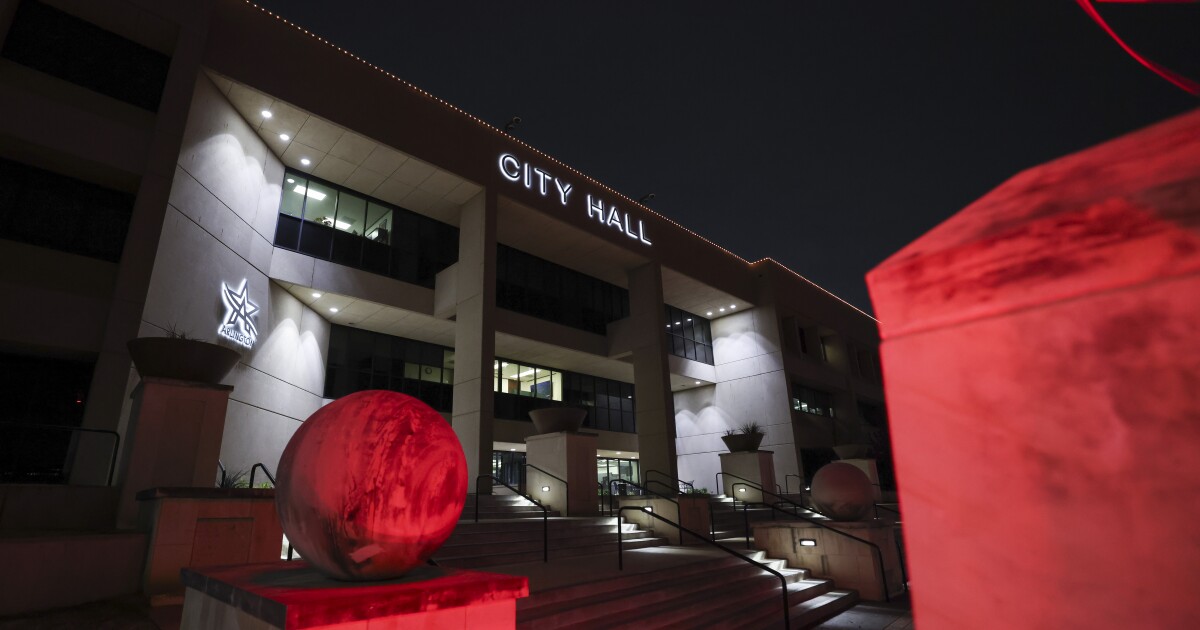The Arlington City Council plans to increase the tax rate by 3 cents to avoid a budget deficit in 2026 and prepare for more expected financial challenges in 2027.
The city will have two town halls to hear from residents on Thursday and Aug. 21.
The council voted unanimously to give city staff the go-ahead to propose the 3-cent tax increase at a meeting Tuesday. The rate will be brought back to the council for approval in September.
The proposed rate would see the average Arlington home’s property tax bill increase by about $5 a month next year, paired with an average increase of $7 a month in fees for utilities like water and sewage.
City Manager Trey Yelverton said previously a tax rate increase of 2 cents would provide enough money to close the gap while the additional 1 cent would allow the city to brace for new exemptions on commercial property that go into effect in 2027.
The city started with a $25 million deficit projected for the 2026 budget. City staff have been working with council since November 2024 to identify ways to cut spending and increase revenue.
Some suggested cuts and reductions involved reducing employee benefits and foregoing a cost of living raise, measures staunchly opposed by police and firefighter unions in the city. Those were presented as options along with the tax increase in June.
Why a tax increase?
The tax rate increase is expected to provide the city with more than $11 million, according to city data. Around $7.4 million (provided by 2 cents from the increase) would be used to balance the 2026 budget.
Another $3.7 million (raised through the additional 1 cent increase) could help the city avoid further budgetary challenges created by a new business property tax exemption and traveling housing finance corporations in 2027.
In 2026, that $3.7 million would be used for one-time investments in technology, facility maintenance and the city’s fleet of vehicles.
The projected deficit is drive in large part by changes at the Tarrant Appraisal District, which assigns home valuations used to determine tax bills.
TAD will not reappraise property values in 2026, meaning an expected increase in taxable value won’t be coming. That’s because the TAD board has decided to only conduct valuations every other year – meaning the next round will come in 2027.
The city has also seen what Yelverton described as an unusually high number of successful property value protests. Yelverton said the city wants its property owners to contest their valuations if they’re overvalued, but said the number of successful protests has exceeded trends and created new problems.
The first vote on the proposed tax rate is slated for Sept. 9 at 6:30 p.m. in the city council chambers. It will include a public hearing, separate from the town halls, where the Arlington community can address the council before the vote.
The budget will receive a public hearing at that same meeting.
Arlington tax bills under the proposed rate
The median taxable home value in Arlington is $330,000, according to the city. Tax rates are determined in cents per $100 of that taxable value.
Under Arlington’s proposed tax rate of 62.98 cents, the owner of that median-valued home would pay $2,078.34 in 2026. But many will end up paying less.
Arlington offers a homestead tax exemption of 20%, the maximum allowed by the state. It’s also the largest exemption claimed in the city, with Arlington data showing more than 62% of all tax accounts claiming it.
Under that 20% exemption, a $330,000 home would instead be taxed as a $264,000 home.
With the exemption in place, this Arlington homeowner would pay the city $1,662.67 in 2026.
Got a tip? Email James Hartley at jhartley@kera.org. You can follow James on X @ByJamesHartley.
KERA News is made possible through the generosity of our members. If you find this reporting valuable, consider making a tax-deductible gift today. Thank you.
